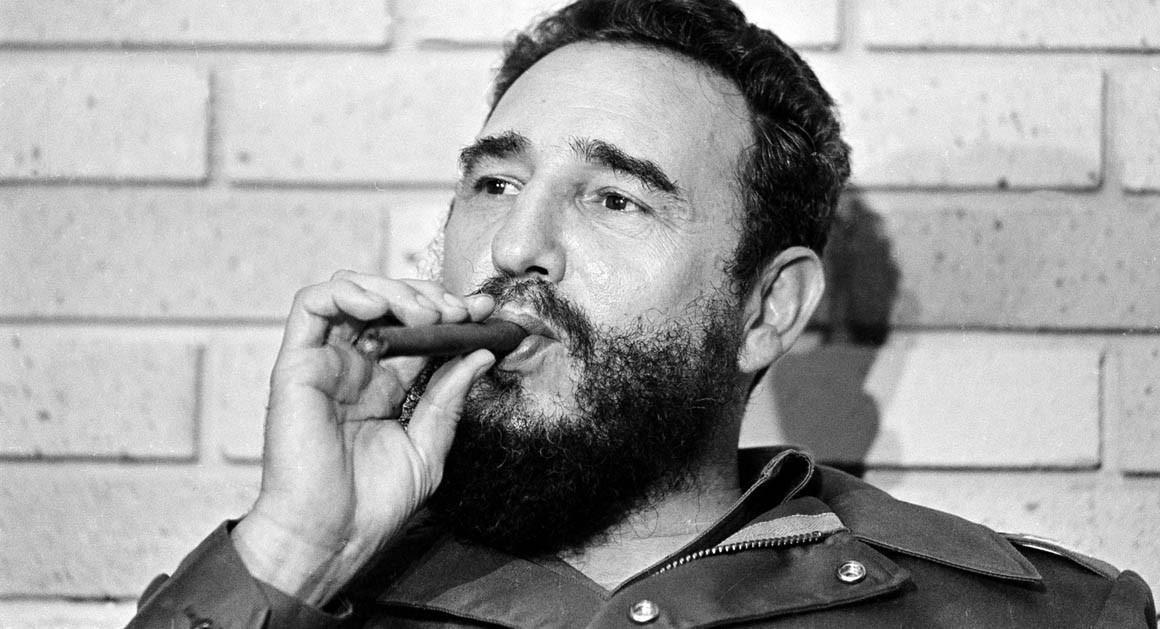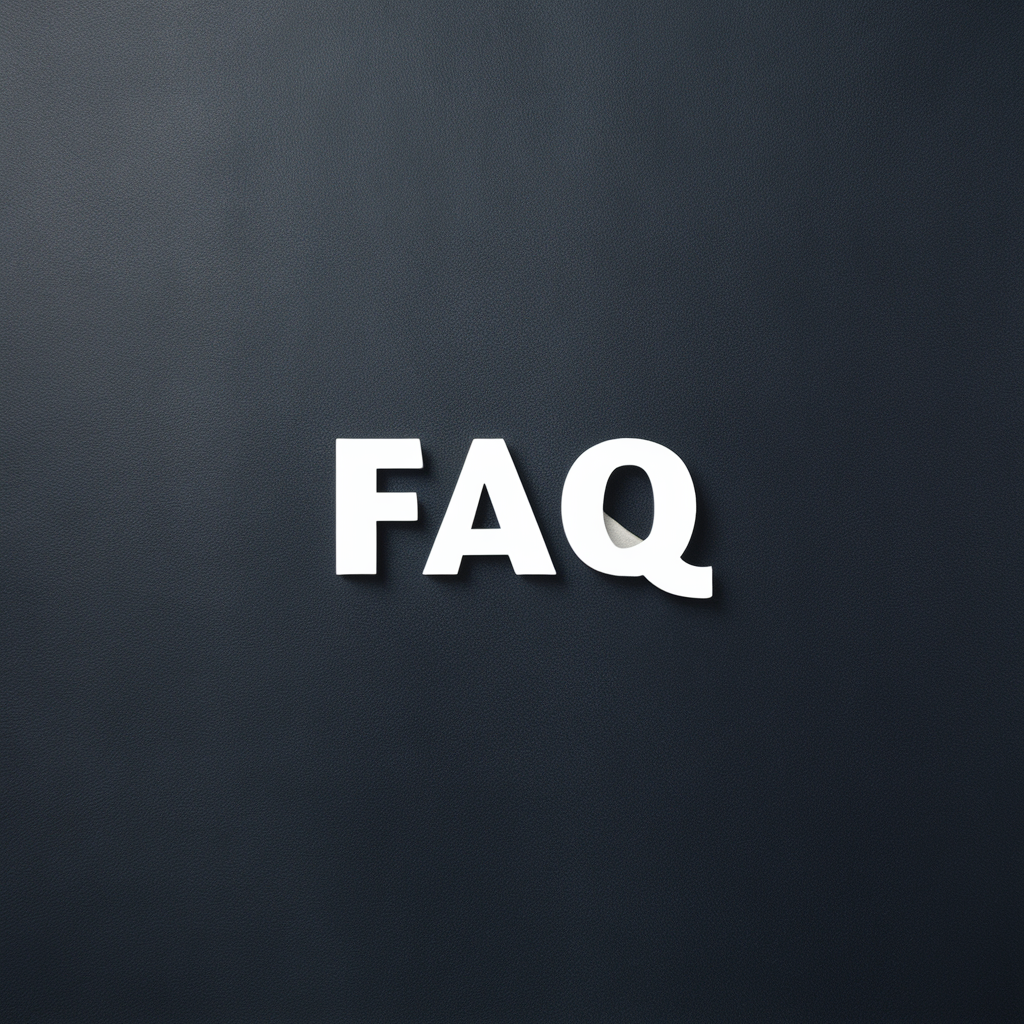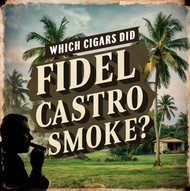Which Cigars Did Fidel Castro Smoke?
Posted by Cigar Tom on 3rd Jul 2024
Fidel Castro, the renowned Cuban leader, was frequently observed with a cigar in his possession. The significance of cigars, particularly about Castro's notable affinity for them, prompts an examination of their nature.
This article delves into the various classifications of cigars, with a specific focus on those preferred by Castro, including renowned brands such as Cohiba and Romeo y Julieta. Additionally, an exploration is undertaken into Castro's procurement methods for cigars and the ramifications of his smoking habit, both from political and economic perspectives.
Who is Fidel Castro?

Fidel Castro, a prominent Cuban revolutionary and renowned political figure, is primarily recognized for his pivotal role as the leader of the Cuban Revolution, working alongside Che Guevara. Together, they orchestrated the transformation of Cuba into a communist state, propelling Castro into a controversial figure within the historical landscape of global politics.
Castro's ascension to power initiated with his audacious assault on the Moncada Barracks in 1953, symbolizing his unwavering dedication to toppling the oppressive regime of Fulgencio Batista. Despite encountering obstacles such as incarceration and exile, Castro's resolve remained steadfast. Backed by the Cuban populace and Guevara's guerrilla warfare tactics, Castro successfully steered the revolution to triumph in 1959.
During his tenure as Cuba's leader, he introduced extensive social reforms and exerted the nation's autonomy in defiance of U.S. hegemony, shaping a socialist state that not only influenced Cuban politics but also left an enduring imprint on global geopolitics.
Why Did Fidel Castro Smoke Cigars?
Fidel Castro's smoking habits played a significant role in his personal life and extravagant lifestyle, serving as a symbol of his iconic stature and profound connection to Cuban smoking traditions.
His appreciation for cigars transcended mere enjoyment; to Castro, smoking cigars represented a daily ritual, a period of reflection and deliberation. The gesture of igniting a cigar signified dominance and command, augmenting his public persona as a charismatic authority figure. Despite his polarizing reputation, Castro's smoking practices introduced an aura of enigma and rebellion to his character, influencing perceptions of him both domestically in Cuba and on an international scale.
Which Cigars Did Fidel Castro Smoke?
Fidel Castro was renowned for his inclination towards iconic cigars, notably exhibiting a preference for brands such as Cohiba, Montecristo, Romeo y Julieta, H. Upmann, Partagas, and Trinidad. This association has elevated these premium cigar labels to a status of exclusivity and sophistication, symbolizing his refined smoking choices and elite connoisseurship.
1. Cohiba
Cohiba has been widely recognized as Fidel Castro's preferred brand, distinguished for its high-quality tobacco and significant role in the Cuban smoking tradition.
Originating in the 1960s, Cohiba cigars were initially produced exclusively for Castro's personal use and as diplomatic gifts. Crafted from a selection of meticulously chosen tobacco leaves, these cigars were meticulously hand-rolled by skilled torcedores in Havana, resulting in a distinctive and opulent smoking experience. Renowned for their smooth flavor profile and exceptional craftsmanship, Cohibas swiftly acquired a reputation as the epitome of excellence in Cuban cigars. The brand's exclusivity and unparalleled quality catapulted it to an iconic status in the realm of premium tobacco, captivating aficionados globally.
2. Romeo y Julieta
Romeo y Julieta was a preferred cigar brand of Fidel Castro, recognized for its cultural significance and stature as one of the premium brands within the realm of cigars.
The appeal of Romeo y Julieta cigars resides in their exceptional craftsmanship, utilizing the finest tobacco leaves and undergoing a meticulous aging process that culminates in a seamless and balanced smoking experience.
Fidel Castro was captivated by the opulent flavors and sophisticated aroma emanating from these cigars, reflecting his admiration for refined luxuries.
Within the domain of iconic cigars, Romeo y Julieta occupies a distinguished position due to its rich history and its association with noteworthy personalities such as Castro, augmenting its allure for aficionados in search of a blend of opulence and tradition.
3. Partagas
Partagas cigars, known for their esteemed reputation for luxury and exceptional craftsmanship, were notably favored by Fidel Castro, adding to their iconic status.
Established in 1845 by Don Jaime Partagas, a Spanish immigrant who relocated to Cuba and established his own cigar factory, Partagas cigars swiftly garnered acclaim for their robust flavors and rich heritage. The unique blend of tobaccos sourced from Cuba's renowned Vuelta Abajo region contributes to the distinctive complexity of the smoking experience.
Fidel Castro's affinity for Partagas cigars further solidified their prestige, as he frequently indulged in them during significant political occasions, elevating them to symbols of power and eminence. Partagas cigars remain highly coveted by connoisseurs and collectors alike, upholding their enduring position as a cornerstone in the luxury cigar market.
4. H. Upmann
H. Upmann cigars, renowned for their vintage allure and esteemed smoking heritage, were also a luxurious indulgence favored by Fidel Castro.
Castro's admiration for H. Upmann cigars was rooted in their impeccable manufacturing process, which entailed the hand-selection of tobacco leaves and the expert rolling of each cigar to perfection. These cigars have withstood the passage of time, upholding a legacy that connoisseurs continue to hold in high regard. The painstaking attention to detail and meticulous craftsmanship devoted to creating every H. Upmann cigar contribute to their exceptional quality and the delightful, flavorful smoking experience they offer.
For Castro, savoring a finely crafted H. Upmann cigar transcended mere routine; it represented a symbol of distinction and refinement.
5. Montecristo
Montecristo cigars, reputed as one of Fidel Castro's preferred brands, have attained legendary status in the realm of cigar smoking.
Recognized for their superb craftsmanship and robust, full-bodied flavor profiles, Montecristo cigars epitomize opulence and refinement within the realm of premium tobacco. With a heritage tracing back to the 1930s, these cigars have persevered through time, acquiring a standing for reliability and superiority. The association with Fidel Castro imparts a historical and political significance to their allure, rendering them a favored selection among connoisseurs and collectors alike. Whether savored in an informal setting or reserved for special occasions, Montecristo cigars offer a profoundly exceptional smoking experience.
How Did Fidel Castro Obtain Cigars?
Fidel Castro acquired cigars through a variety of channels, including diplomatic offerings and direct procurement of exclusive selections from Habanos S.A., illustrating both his personal preferences and his position as a discerning collector of premium tobacco products.
His affinity for fine cigars transcended mere consumption, as he frequently utilized them as diplomatic gestures to establish relationships with political figures and dignitaries. The tobacco industry, particularly in Cuba, played a pivotal role in furnishing Castro with a steady provision of high-end cigars, exemplifying the convergence of luxury commodities and political sway. As the foremost manufacturer of Cuban cigars, Habanos S.A. ensured that Castro enjoyed access to some of the most esteemed and sought-after cigars globally, further cementing his reputation as a distinguished authority within the cigar aficionado community.
What Was the Impact of Fidel Castro Smoking Cigars?
Fidel Castro's smoking habits had a significant impact, reinforcing his iconic status as a political leader and public figure with global influence. These habits were deeply intertwined with the historical significance and cultural value of Cuban cigars.
1. Political Symbolism
The smoking of cigars by Fidel Castro functioned as a potent form of political symbolism, solidifying his iconic status as a revolutionary and Communist leader. The act of smoking cigars became intricately intertwined with Castro's public image, frequently portrayed in photographs and speeches. It transcended mere personal preference, instead serving as a calculated decision to convey qualities such as strength, resilience, and a deep connection to his Cuban heritage. The cigar, with its robust aroma and distinctive appearance, evolved into a visual emblem of his defiance against opposition and imperialist forces. Through this seemingly mundane action, Castro effectively communicated a narrative of rebellion, fortitude, and steadfast dedication to his cause.
2. Economic Impact
Fidel Castro's connection with cigars had a notable economic impact on the tobacco industry, enhancing the worldwide influence and demand for Cuban cigars and premium brands. His fondness for cigars not only strengthened Cuba's standing as a leading producer of high-quality tobacco but also drew international attention to the craftsmanship and flavor of Cuban cigars.
This upsurge in demand resulted in expanded export opportunities and revenue for the Cuban cigar industry, positioning it prominently in the global market. Furthermore, Castro's public persona as a cigar enthusiast added a touch of mystique and allure to Cuban cigars, enticing collectors and aficionados to seek out these iconic tobacco products.
3. Popularity of Cuban Cigars
Fidel Castro's prominent endorsement of Cuban cigars significantly enhanced their appeal, establishing them as iconic choices among cigar connoisseurs and elevating their stature within the global smoking community. His frequent public appearances depicted in photographs and videos, showcasing him with a cigar in hand, cultivated a compelling and enduring image that resonated with cigar enthusiasts worldwide.
The mystique and sophistication associated with Cuban cigars attracted many individuals, who viewed them as symbols of luxury. Castro's fondness for cigars further reinforced their esteemed reputation, leading to a notable escalation in demand for these premium tobacco products. Consequently, Cuban cigars evolved beyond a mere smoking preference to become a symbol of status for those who savored them.
Frequently Asked Questions

What brands of cigars did Fidel Castro smoke?
Fidel Castro was known for smoking two specific brands of cigars: Cohiba and Davidoff. He was especially fond of the Cohiba Lancero and the Davidoff No.2.
Did Fidel Castro only smoke Cuban cigars?
Yes, Fidel Castro was a staunch supporter of Cuban products and only smoked cigars made in Cuba. He believed in promoting the country's economy and refused to smoke cigars from any other country.
Why were Cohiba cigars special to Fidel Castro?
Cohiba cigars were not available for purchase by the general public in Cuba until 1982. They were created exclusively for Fidel Castro and high-ranking government officials. This made them a symbol of power and prestige in Cuban society.
Did Fidel Castro have a favorite cigar size?
Yes, Fidel Castro's favorite cigar size was the Lancero. He was often seen smoking the Cohiba Lancero, which is a long and thin cigar measuring 7.5 inches in length and 38 ring gauge.
Did Fidel Castro smoke cigars his entire life?
No, Fidel Castro actually quit smoking in 1985 due to health concerns. He suffered from respiratory problems and gave up cigars in order to set a good example for the Cuban people.
How did Fidel Castro's cigar smoking impact the industry?
Fidel Castro's love for cigars and his high-profile status helped put Cuban cigars on the map as some of the best in the world. His preference for Cuban cigars also increased their popularity and demand in other countries.




